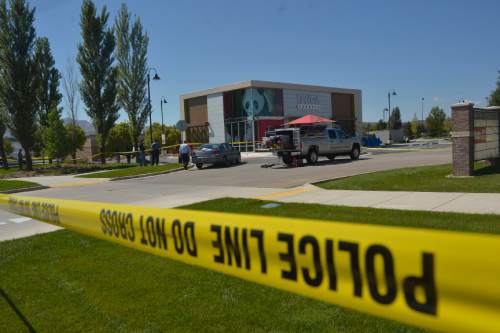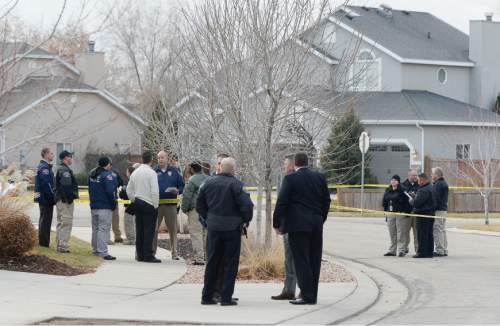This is an archived article that was published on sltrib.com in 2015, and information in the article may be outdated. It is provided only for personal research purposes and may not be reprinted.
Some Utah lawmakers would like to see all Utah police officers trained in how to recognize and de-escalate encounters involving people with mental illness or substance-abuse issues, and many departments around the state already are moving in that direction.
In the police academy, officers train for hours on the use of firearms, but many never use their weapons in their entire careers in law enforcement, said Krista Dunn, the deputy police chief in Salt Lake City and a manager of the Utah Crisis Intervention Training program.
"When we train officers on dealing with folks who have mental illness," Dunn said, "we know likely the very first day they're on the street, they'll deal with folks who have mental illness."
Currently, the Salt Lake City Police Department is working toward getting all of its front-line officers — those considered "first responders" — through the CIT program.
The Utah Highway Patrol set the same goal two years ago and so far has trained half its troopers. Salt Lake County also is moving in that direction, said Undersheriff Scott Carver. About a quarter are currently trained.
Sen. Howard Stephenson, R-Draper, co-chairman of the Legislature's Administrative Rules Review Committee, said it would be "wonderful" if every officer had the capacity to "in one situation be Mother Teresa" and in another respond with necessary force. And he said he would like to see officers who get the training paid more for their skills.
The push for police reforms comes in the wake of a rash of high-profile deadly encounters nationally and in Utah. The state's first three homicides of 2015 were officer-involved shootings.
Doug Thomas, director of the Utah Division of Substance Abuse and Mental Health, said the target for CIT training has typically been 25 percent of the police force in an urban department, so officers are on duty to respond to situations. But, he said, the training shouldn't be mandated.
"If you mandate something, there's a hesitancy, there's some pushback," Thomas said. "So now they're trained in something they don't believe in and have not bought into and it doesn't affect the way they do their police work. To us, that creates a false sense of security when that officer arrives [at an incident]."
Sen. Jim Dabakis, D-Salt Lake City, was unswayed by the argument that there might be cultural pushback against mandatory training.
"Oh well," he said. "This seems to me to be such a good thing that every officer ought to have that training and that understanding."
He said he hopes the Legislature will come up with the money to expand the program so more officers can get the training.
Expanding the training would require more money. Currently, there is a list of up to 100 people waiting to get into the two CIT academies, Dunn said.
Marina Lowe, legislative and policy counsel with the American Civil Liberties Union of Utah, said making sure the officers have the best possible training could avoid missteps and save the government money fighting future lawsuits.
Vaughn Howard, legislative chairman of the Utah Fraternal Order of Police, said the training is valuable and changes the way officers deal with mentally ill individuals, but it should be voluntary.
"We don't believe this training is a fix-all," Howard said. "We believe it's another tool to be used in our toolbox."
Connor Boyack, president of the Libertas Institute, a libertarian think tank, said it's absurd to think a private employer wouldn't require employees to receive training fundamental to doing their jobs just because the workers don't want it.
Friday's discussion of officer training and how to avoid the unnecessary use of force by police was part of an ongoing review during the summer of how law enforcement uses force. It will include a discussion of body cameras, investigations of incidents and psychological evaluations for police cadets.
The Utah Office of Education will also be reviewing its policies for disciplining students, preventing bullying and hazing of students, and the rights of students who are victims in situations that result in discipline.
"There seems to be a disjointed, crazy quilt of laws and rules and practices applying to this," Stephenson said.
Dabakis, the only openly gay member of the Utah Legislature, said he wants the review to look specifically at how to deal with gay, lesbian, bisexual and transgender students. Dabakis said he had recently attended three funerals of young LBGT students. In one instance, the student had gone to school officials to talk about the problems he was having, but they believed policies kept them from doing anything but calling the student's parents, who didn't get the message.
A few months later, the student took a gun to school and killed himself.
State Superintendent Brad Smith committed to examining the state rules and policies to deal with disciplinary issues and victims' rights. He said he would report back to the Legislature at year's end.
Twitter: @RobertGehrke





